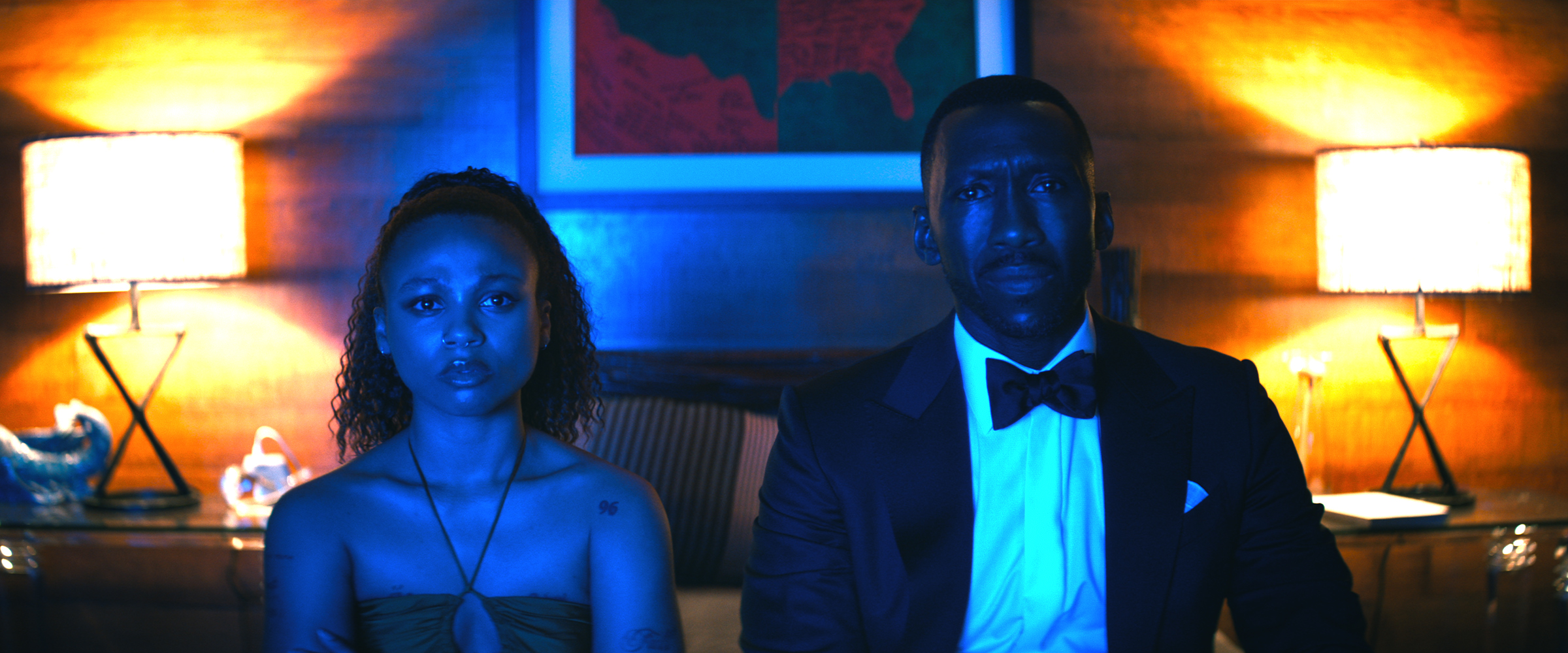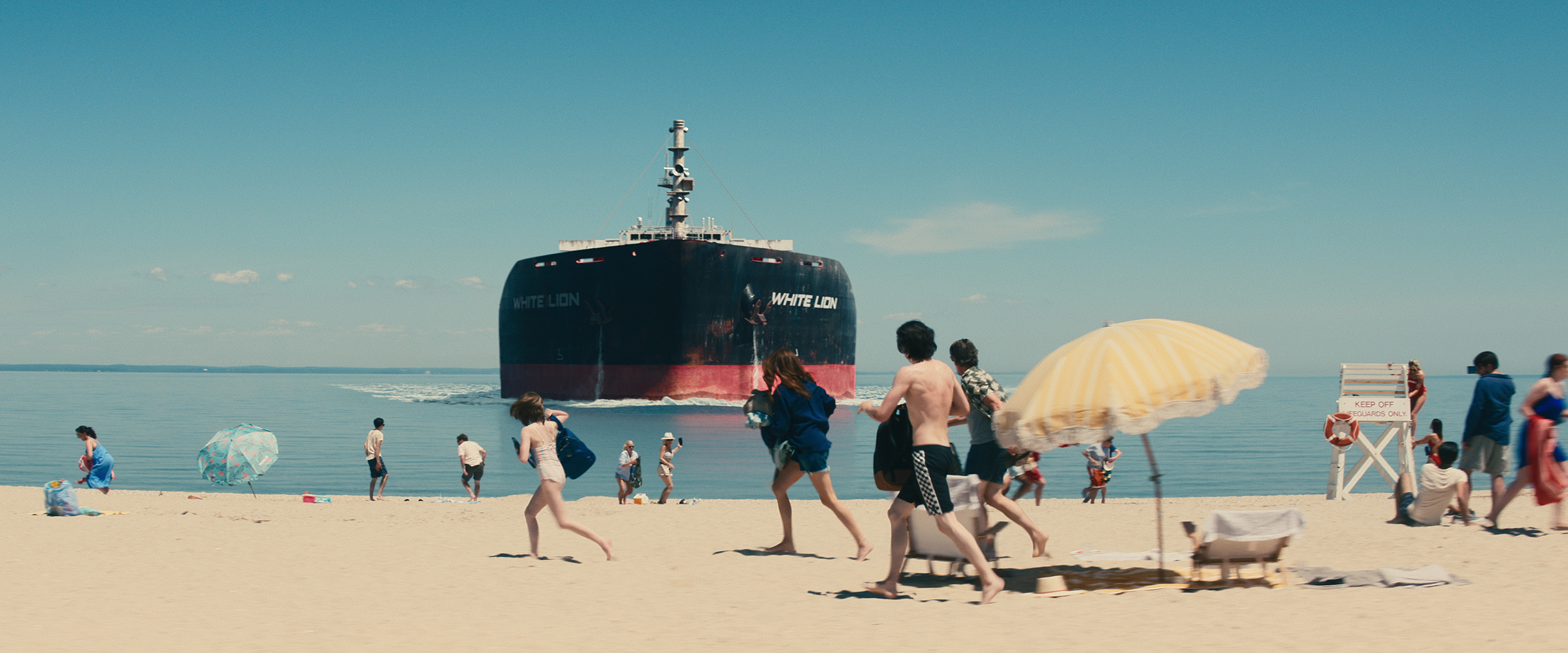Warning: This post contains spoilers for the book and movie versions of Leave the World Behind
When Rumaan Alam's novel Leave the World Behind was first published in the fall of 2020, there was a wry irony to the ways in which its fictional world, ravaged by an alarming and mysterious global crisis, paralleled the chaos of the world in the midst of the COVID-19 pandemic. Now, three years later, the unnerving experience of Alam's book will be on the big screen with a Netflix adaptation of the same name. Written and directed by Mr. Robot's Sam Esmail, the film releases in theaters on Nov. 22 before hitting the streaming platform on Dec. 8.
In the movie, Amanda (Julia Roberts) and Clay (Ethan Hawke) Sandford, an upper-middle class white Brooklyn couple, have decamped for a relaxing vacation at a luxurious Airbnb on Long Island, along with their two children, Archie (Charlie Evans) and Rose (Farrah Mackenzie). Their idyllic trip is interrupted, however, when George "G.H." Scott (Mahershala Ali), the wealthy Black owner of the Airbnb, and his daughter Ruth (Myha'la Herrold), show up unexpectedly at the house, after a citywide blackout prompts them to leave Manhattan. Tensions rise as the two families are forced to cohabitate, with each one forced to confront their true feelings about race and class as the world (literally) burns around them.
Read more: I Avoided Apocalypse Stories for Months. Then Leave the World Behind Became My Greatest Comfort
Like the book, the movie deals in both thrills and dread, but in bringing the story to life on the screen, Esmail, who also wrote the screenplay, made some pivotal changes. Here, we've rounded up the ways that the film adaptation of Leave the World Behind differs from the book.
Ruth is now George's daughter, not his wife

Of all the changes made for the film adaptation, the re-writing of the character of Ruth might be the most outsized. In the book, George and Ruth are a wealthy and cultured older couple, with Ruth characterized as both reserved and discerning. However, in the movie, George is closer in age to Amanda and Clay, and Ruth has been re-imagined as George's outspoken twenty-something daughter.
Esmail said that he decided to re-write the characters because he wanted to differentiate the book from the movie as pieces of art in their own rights.
“I'm not a fan of making a carbon copy of the book," he said in an interview with Entertainment Weekly. "What I wanted was to create this standalone piece so that you could read the book and you could watch the movie and one wouldn't spoil the other, that there were sort of two separate pieces and two different interpretations of the same story.”
The terror is more defined in the film

In the book, while unsettling things like a loss of power, sudden sickness, and an unexplained piercing noise occur, the film takes the dread a step further, by showing plane crashes, ships uncontrollably beaching, and self-driving cars running amuck, as a result of a seeming cyber attack. Esmail shared with Entertainment Weekly that he did this to tap into what might be our biggest fears as a tech-reliant society.
"When I expanded the disaster elements in the sort of cyber attack context, I think that exposed that notion to the audience of what a cyber attack might look like,” he said. “Because cyber attacks in general are a little obtuse and mysterious in their own right. I think people don't quite grasp what that means or what that would look like. And when you start dramatizing that on screen and they start realizing that that's a real connection to reality, I think that's where the real terror might hit.”
Read more: Rumaan Alam Mines Life for Inspiration
Author Alam maintains that the changes that Esmail made still work toward the same conclusion and that they were necessary to make viewers feel what readers felt.
"The book does say this thing is happening and this thing is happening, and it declines to fit them all together into one explanation. There’s no actual explanation offered in either version," Alam told the Hollywood Reporter. "The difference is that I have access to the ability to tease the reader in a different way than Sam is able to tease the audience...when I watch the movie, I see a work that is aiming to leave its audience the same way that my book left its readers, but the conventions of the form are just different. The two feel really intertwined to me and the adaptation feels very faithful to what I was trying to accomplish."
The ending is slightly altered
In both the book and the movie, Rose is intrigued by a house she sees in the distance. In the book's final chapter, she enters the house and gathers supplies before presumably making her way back to the others. In the movie, Rose is obsessed with the show Friends and is heartbroken when she can't finish the show's finale because of the blackout. When she makes it to the house, she's not as concerned with finding supplies or returning to her family; instead, she finds a DVD player and a boxed set of all the Friends' seasons in the house's bunker and proceeds to watch the final episode.
More Must-Reads from TIME
- Caitlin Clark Is TIME's 2024 Athlete of the Year
- Where Trump 2.0 Will Differ From 1.0
- Is Intermittent Fasting Good or Bad for You?
- The 100 Must-Read Books of 2024
- Column: If Optimism Feels Ridiculous Now, Try Hope
- The Future of Climate Action Is Trade Policy
- FX’s Say Nothing Is the Must-Watch Political Thriller of 2024
- Merle Bombardieri Is Helping People Make the Baby Decision
Write to Cady Lang at cady.lang@timemagazine.com